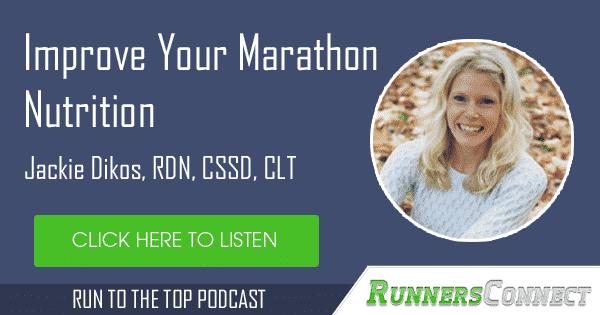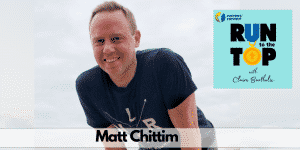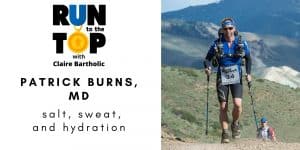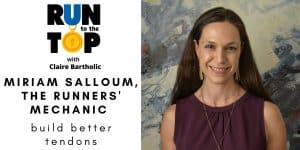Many of us want to either train for, or improve upon, a great marathon finish.
So we log miles, minutes and hours of running each week. We focus on endurance, speed, flexibility, strength and mental toughness. And, of course, NUTRITION.
You wouldn’t put water in the fuel tank of a Ferrari. Or a Jeep for that matter.
But how does what we eat, and when we eat it, positively influence our race-day performance?
Jackie Dikos is a nutritionist, champion marathoner, and founder of NutritionSuccess. In 2008 and 2012 she participated in the Olympic Marathon trials. She won the 2010 Indianapolis Monumental Marathon and was the 15th place female finisher in the 2008 Chicago Marathon. She is a contributor to Runner’s World, Running Times, Women’s Running and Shape magazines.
In this episode, she teaches us how to fuel and hydrate during training, taper and race day while explaining the importance of macronutrients and how to combine them for optimal energy.
She also talks about why she focuses on a ‘colorful pate”, how and why to calculate sweat-rate and what to do with that information to more effectively leverage aid stations during marathons.
Jackie’s firsthand knowledge and experience provide a host of great information, so don’t be surprised if you listen to this several times to fully absorb these nutrients of fueling wisdom.
Questions Jackie is asked:
2:38 First Four:
- How old are you?
- Where were you born?
- Where do you live now?
- What is your favorite race distance or type of race?
6:42 What do your designations mean?
4:00 What kind of training is involved with these?
4:51 What led you into your field?
6:51 How did you qualify for the olympic trials, how did your nutrition strategy help and how did it evolve from 2008 to 2012?
10:23 How much of the macronutrients do people need and how individualized is it?
11:47 What are the macronutrients and how do they work with calories for energy management?
13:42 How should we approach our nutrition during a typical 16-week marathon training cycle?
16:04 What about gaining muscle vs. losing weight during training?
16:45 How should nutrition change for the 2-week taper before race day?
19:07 What role does fiber play before the race?
21:13 How important is it to test foods prior to race day?
21:48 What do you advise about eating on race day and timing that fuel intake?
24:36 When and how should we integrate electrolytes?
26:08 What is ‘sweat-rate’ and how is it a helpful data tool?
31:12 Water vs. Electrolytes: What are your thoughts on consuming electrolytes from aid stations if you’re not familiar with that product?
32:26 What about supplements and powders during training?
35:13 Is ‘Cronometer’ a free or paid website / app?
36:05 How might training and nutrition change decade by decade as we age?
37:11 As we age, does it become more difficult to absorb protein?
37:47 What myths about marathon and sports nutrition would you like to dispel?
38:25 What people or experiences in your life had made the biggest impact?
39:20 What was it like winning the Indianapolis Monumental Marathon?
42:18 Final Kick Round:
- What is your favorite local training run (location, starting point, parking, distance, terrain and safety issues)?
- Favorite running book(s)?
- Advice for new runners?
- Favorite Quote?
Quotes by Jackie:
“I encourage testing Ferritin, Vitamin D, Magnesium, Zinc (levels); those are some big ones that I think would be really beneficial to supplement if someone’s low. It can be night and day in terms of their performance and injury healing.”
“I feel like any time I finally realized I was thirsty, I was too far dehydrated to play catch-up.”
“The goal throughout that entire training cycle is to figure out what foods your body really loves and and what ones it doesn’t really care for.”
“The mirror can be a great guide. If you see muscle forming, but the scale is going up a little bit, it could just be an indicator that muscle mass weighs more than fat mass, and you’re doing a great job of leaning out.”
“I don’t like to focus on calories very much at all. I focus much more on each macronutrient based on the person’s body weight and activity level versus just a pure calories in / calories out approach.”
“Running just took an exciting shift. It wasn’t just working the workout into the day; it felt like it was this active science I was performing.”
Take a Listen on Your Next Run
Want more awesome interviews and advice? Subscribe to our iTunes channel
Mentioned in this podcast:
Run To The Top Winners Circle Facebook Community
Book: Finish Line Fueling by Jackie Dikos
Matt Ebersole’s Personal Best Training
Cronometer.com – Nutrition, Fitness, & Health Data Tracking
Indianapolis Monumental Marathon
Eagle Creek Park Indianapolis Running Trails
Book: Run Strong, Stay Hungry: 9 Keys to Staying in the Race by Jonathan Beverly
Follow Jackie on:
Instagram
We really hope you’ve enjoyed this episode of Run to the Top.
The best way you can show your support of the show is to share this podcast with your family and friends and share it on your Facebook, Twitter, or any other social media channel you use.







